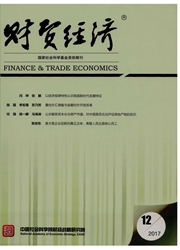

 中文摘要:
中文摘要:
基于制造业需求对生产性服务业发展的重要作用,本文从规模经济和创新激励等渠道分析了制造业需求变化对生产性服务业效率的影响机理,并考察了地区经济发展水平对这种影响的调节效应。本文以1995—2014年中国制造业和生产性服务业的面板数据为样本所做的经验研究发现:(1)制造业对生产性服务业需求的提高有助于生产性服务业效率的改善,且与劳动密集型制造业相比,资本密集型制造业需求程度的提高对生产性服务业效率的促进作用更大;(2)虽然制造业需求的增加在总体上有利于生产性服务业效率的提高,但是在经济发展的不同阶段,这种促进作用并不呈现简单的线性效应,而是表现为一种非线性的门槛效应,即当越过一定的经济发展水平门槛后,制造业需求对生产性服务业效率的促进作用会有明显跃升,且资本密集型制造业所面临的门槛水平要高于劳动密集型制造业。本文的研究在一定程度上为制定科学的产业发展战略提供了有益启示。
 英文摘要:
英文摘要:
Although service industry has become the biggest sector in China, the development of productive service still depends on the development level of manufacturing, because manufacturing is the main demanders of productive services. Considering the important role that the demand from manufacturing has played in the development of producer services, this paper analyzes the influence mechanism of manufacturing demand on efficiency of productive service through two channels, which are the scale effect and innovation incentives, and especially emphasizes the adjustment effect of economic development level on the relationship between manufacturing demand and efficiency of productive service. Based on the panel data of China's manufacturing industry and productive services from 1995 to 2014, the empirical result shows that: (1) the demand from manufacturing was helpful to the improvement of efficiency of productive services, and compared with the labor-intensive manufacturing, the demand from capital-intensive manufacturing played a more important role in improving efficiency of productive services; (2) at different stages of economic development, the promoting effect of manufacturing demand on efficiency of productive services showed a nonlinear threshold effect rather than a simple linear effect, namely when crossed a certain threshold of economic development level, the promoting effect would be more significant, and the threshold level faced by capital-intensive manufacturing industry was higher than that of labor-intensive manufacturing industry. These findings may be helpful for making industrial development strategy.
 同期刊论文项目
同期刊论文项目
 同项目期刊论文
同项目期刊论文
 期刊信息
期刊信息
